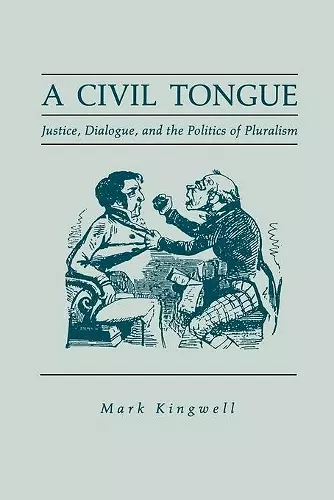A Civil Tongue
Justice, Dialogue, and the Politics of Pluralism
Format:Paperback
Publisher:Pennsylvania State University Press
Published:15th Apr '95
Currently unavailable, and unfortunately no date known when it will be back
This paperback is available in another edition too:
- Hardback£65.99(9780271013343)

This book is about a widely shared desire: the desire among citizens for a vibrant and effective social discourse of legitimation. It therefore begins with the conviction that what political philosophy can provide citizens is not further theories of the good life but instead directions for talking about how to justify the choices they make—or, in brief, "just talking."
As part of the general trend away from the aridity of Kantian universalism in political philosophy, thinkers as diverse as Bruce Ackerman, Jürgen Habermas, Alasdair MacIntyre, and Richard Rorty have taken a "dialogic turn" that seeks to understand the determination of principles of justice as a cooperative task, achieved in some kind of social dialogue among real citizens. In one way or another, however, each of these different variations on the dialogic model fail to provide fully satisfactory answers, Mark Kingwell shows. Drawing on their strengths, he presents another model he calls "justice as civility," which makes original use of the popular literature on etiquette and work in sociolinguistics to develop a more adequate theory of dialogic justice.
“Kingwell shows how, despite wide disparities of perspective and interest, participants in political conversation can arrive at shared principles of justice. Beautifully written and powerfully (though politely) argued, A Civil Tongue makes an original and important contribution to the conversation of contemporary political theory.”
—Spitz Prize Selection Committee
“Kingwell’s central thesis is that civility is both a precondition of justice under conditions of moral pluralism and a commitment that would emerge from a dialogue oriented towards the discovery of just norms. The notion of civility is developed in a rich and interesting way, grounding it both ethically and historically, and it is defended through a series of powerful and convincing arguments. This work makes an important contribution to a vibrant area of contemporary political theory. It will be of interest to scholars in political theory, including people whose disciplinary homes are political science, sociology, philosophy, and literary studies.”
—J. Donald Moon, Wesleyan University
ISBN: 9780271027739
Dimensions: 229mm x 152mm x 21mm
Weight: 426g
280 pages